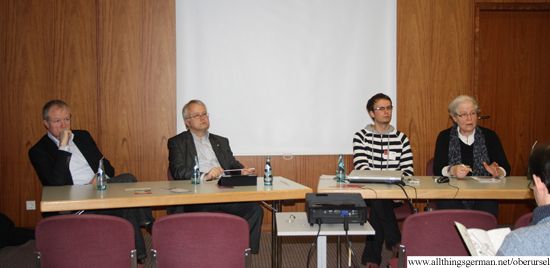With fresh snow on the ground and in some places still falling perhaps going shopping in Oberursel by bicycle was not the most pressing topic for many people last Sunday when the ADFC held their “Tag des Fahrrads” in the Stadthalle.
Over 400 people attended the event – significantly down on the 1,000 that had visited the previous year.
And yet shopping was one of the main topics this year and a debate on the very subject of going shopping by bicycle in Oberursel was held with the chairman of the forum for the self-employed (Fokus-O), Michael Reuter, the Mayor Hans-Georg Brum, Stefan Opitz from the project “Einkaufen-mit-dem-Rad.de” in Darmstadt and local cyclist Helga Hett.

Michael Reuter, Hans-Georg Brum, Stefan Opitz and Helga Hett
Before concentrating on the situation in Oberursel, Stefan Opitz explained how the project in Darmstadt had worked, including the measures that had been taken to get shop interested in the scheme and make people aware of what the shops had on offer. It was established that cyclists visited the shops more often than car drivers, maybe by way of necessity, and that in the long run may even spend more money in the town centre as a result.
But it also opened up questions of whether shops where prepared to deliver larger items to people homes or take care of shopping whilst people went to other shops.
Hans-Georg Brum then pointed out two factors that play an important role in Oberursel. Firstly, there are a good number of cycle paths leading into the town, with one highlight being the new cycle lanes installed in advance of the Hessentag in 2011.
On the other hand, the U-Bahn line makes it easy to get into the town centre from many areas, and many people may use that instead of considering going by bike.
Recently the rules on parking spaces in the town centre (“Stellplatzsatzung”) have been changed to encourange businesses moving to the area to create spaces for bicycles in front of their shops, rather than having to pay a charge to the town because of the lack of car parking spaces on their premises.
Michael Reuter said that Fokus O wanted a “lively town centre”, and presented a new flyer that has been printed with a map of the town centre showing the locations of the public bicycle stands.
And finally, Helga Hett, who has lived in the town for 50 years, commented that much had changed in the town in that time, but also used the opportunity to point out some of the problems that cyclist face in Oberursel’s streets.
Many of the questions that followed from the audience were concerned with particular problems that exist for cyclists in the town.
But with the shops in the town centre in mind, there are several things that were mentioned that need to be done to get people on their bikes:
- better signs for cycle routes and the bicycle stands
- get the message out to both the shops and also the residents so that people are aware of which services the shops offer
- clear up the regulations on where cycling is allowed in the pedestrian precinct
The general consensus of opinion was, however, that Oberursel is already well on its way to being a bicycle-shopping-friendly town.
Of course, it would have been better if more people had been there to experience the debate and give there opinion, but at the end of the day ADFC spokesman Paul Needham was still happy with the result. Referring to the quality of the discussions taking place, rather than the quantity of visitors, he commented that “outside it was winter, but inside it was spring.”




